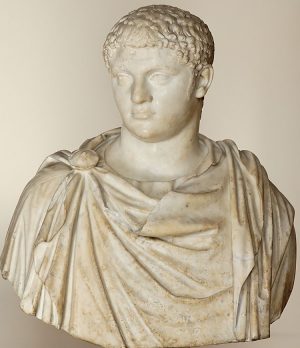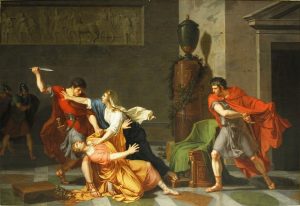| Geta | |
|---|---|
 |
|
| Roman Emperor | |
| In Power | 209 – Dec 26,211 |
| Born | Mar 7, 189 Rome |
| Died | Dec 26, 211 (aged 22) |
Troubled by a hatred that burned between him and his brother, Geta lived a short life and ruled only briefly. He died of stab wounds in his mother’s arms.
Early Life
Publius Septimius Geta was born in Rome in 189, the son of Septimius Severus and Julia Domna, and the younger brother of the hot-headed Caracalla. He was never on good terms with his brother and was believed to have possessed the same volatile temper. Fights would frequently erupt between the two, and their mother often had to come between them. However, Geta was more reverent towards his father and a more affectionate son to his mother. Geta was also noted to be the more intellectually inclined of the two, having a taste for literature and being happy when in the company of writers.
In 198, Geta was declared Caesar by Severus, and in 209, was elevated to Augustus. In contrast, Caracalla was granted the title of Augustus years earlier, in 198, even though he was only one year older. It would seem that Severus was priming both his sons to be emperors, although he appears to have a slight preference for the elder Caracalla. He positioned Caracalla as his second-in-command in his military expeditions but entrusted plain, administrative duties to Geta. Meanwhile, the fighting between the two sons kept on, and the ill-will between them deepened as they grew older.
Ascendance to Emperor Status
When Severus died in 211, he urged his two sons to come to terms and make peace with each other. This clearly did not happen; as when Geta and Caracalla took on the status of joint emperors, they brought along with them their years-long grudge. They were expected to wield equal power, but the brothers’ disdain for each other prevented any real chance of a harmonious co-rulership. The situation had become so heated that both men lived in constant fear of being assassinated by the other. Geta and Caracalla lived in separate parts of the imperial palace, and both made use of separate entrances. Even the hallway that connected the two halves of the palace was blocked, as both were paranoiacally suspicious of being poisoned by the other. The brothers rarely saw each other, and when they did, they were surrounded by their own bodyguards, who were themselves on edge. Both emperors played their own brands of deadly political chess, seeking the approval of the senate and meddling in court cases to help influential friends.
Tensions had become unbearable at some point that Geta and Caracalla finally agreed to split the empire. Geta would rule the east, with Alexandria or Antioch as his capital, while Caracalla would remain in Rome. However, Julia Domna stopped this from happening because she feared she would not be able to watch over her sons’ maneuverings if the split were to push through.
Death
During the Festival of Saturnalia in 211, it was found that Caracalla tried to assassinate Geta, prompting the younger emperor to add more bodyguards.
The following week, Geta would eventually fall to Caracalla’s cunning. The elder emperor pretended to seek peace with the younger emperor and suggested that they meet at their mother’s house. Geta failed to sense the deception and entered Julia’s house without his bodyguards, at which point, a group of centurions burst through the door and stabbed Geta. The young emperor ran to Julia for help but repeatedly received more thrusts of the blade. He died in his mother’s arms. Caracalla swiftly ordered the killing of all of Geta’s friends and associates and proclaimed a damnatio memoriae against his dead brother. To officially erase Geta from the public’s memory, his image was removed from paintings and coins, and his name was erased from inscriptions. While the attempt to erase Geta from history was relentless, it failed, as plenty of Roman coins that bear his image survived.
